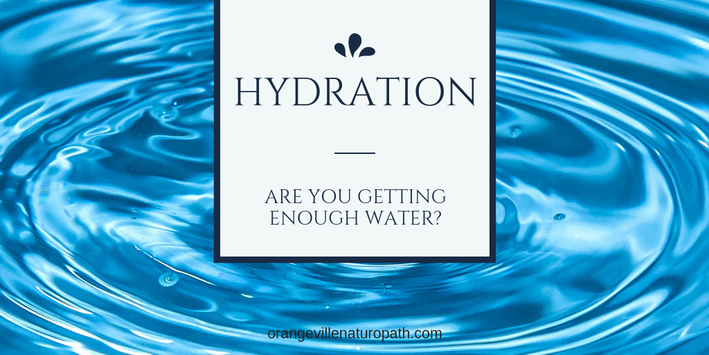
In the summer we get hot and thirsty, so it's a little more natural to reach for a glass of water. But what about the winter? Today I'm inspired to write about hydration because I've been hearing from patients saying that lately their water intake, while normally good, has been severely lacking or non-existent.
The thing is, regardless of season, our bodies are made of 60% water, by weight. This percentage goes down if we have extra adipose tissue (muscle holds more water than fat), or when we don't drink enough. Adequate water in our bodies keep the blood thin, which takes pressure off the cardiovascular system. It allows for proper elimination through the lungs, kidneys, and bowels. It curbs food cravings and reduces pain. Proper hydration also increases energy levels dramatically, and it's one of the first things I ask about when someone is concerned about fatigue.
How much is enough? There isn't a downside to drinking more - other than regular bathroom trips (unless you have a kidney issue). However, there are a few signs to look for that point to dehydration:
- dry skin
- foggy thinking
- fatigue or energy crashes
- headaches
- constipation
- muscle cramps
- skin that lacks lustre
- concentrated yellow or cloudy urine
Of course, drinking plain water is THE BEST option. However, I totally understand that it doesn't always happen, or sometimes we need to switch things up. Some people don't always absorb the water they are getting, and need electrolytes, or other adjustments to help get the water into their cells.
How to stay hydrated without water:
Foods
- soups - they have a high water content compared to other foods, and are often high in vegetables so the nutrients help the water get absorbed by the body
- vegetables and fruits - cucumbers, celery, blueberries, pineapple, lettuce, strawberries, spinach, bok choy, zucchini, tomatoes, swiss chard....
- most vegetables are 90% water by weight - smoothies - liquid meals help get more water into the body by replacing dry foods
- try 1 cup frozen fruit with 1/2 avocado and cover with liquid of your choice
- add boosters like protein powder if desired
- herbal teas - they can also provide the benefits of whatever herbs they contain
- sparkling mineral water - contain minerals to help with absorption
- I really like Gerolsteiner for the high magnesium content -> very helpful for relaxation if you have a glass in the evening (hint: extra beneficial for hydration if you replace dehydrating alcohol for a mineral water) - lemon water or other infused waters to improve flavour and absorption
- lemon or lime (can serve warm like tea)
- a few cucumber slices
- a few raspberries or strawberries
- a sprig of mint or rosemary - coconut water
- maple water (found at Zehrs in the natural health section)
- RHD Milieu by Physica Energetics (purchase at the clinic)
- homeopathic drops that you put into your water to help with absorption of water into the cells, works very very well
- we lose a lot of water through our skin so if you have dry skin, ensure you protect the barrier function of the skin by using coconut oil or other natural oil moisturizers
- watch caffeine and alcohol
- start the day with one glass of water to begin the day in a positive water ratio
- try to have 1 litre of water by noon to stay on track and stay out of the bathroom at night
- humidify - set your furnace (purchase a humidifier) and set it to the upper end of the recommended 45-55% humidity level
- (fun fact: studies show that humidity above 43% keeps the flu virus from spreading as easily)
I hope this helps to encourage you to become more hydrated!
Take good care,
Dr. Christa
 RSS Feed
RSS Feed